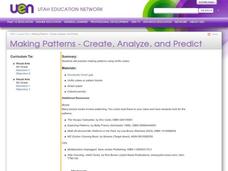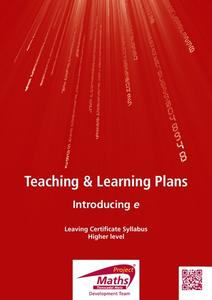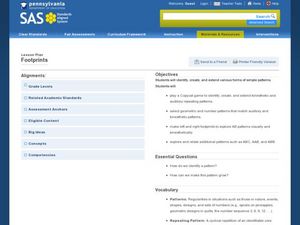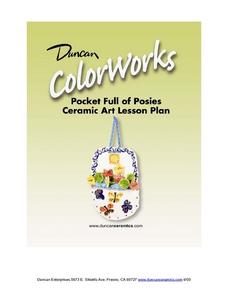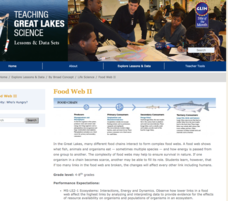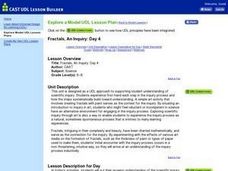University of Colorado
Patterns and Fingerprints
Human fingerprint patterns are the result of layers of skin growing at different paces, thus causing the layers to pull on each other forming ridges. Here, groups of learners see how patterns and fingerprints assist scientists in a...
Curated OER
Making Patterns - Create, Analyze, and Predict
Fourth graders practice making patterns using Unifix cubes and identify, analyze, and determine rules for describing numerical patterns involving operations and nonnumerical growing patterns. They also find an example of a pattern in...
Curated OER
Changing Energy: Landforms and Dance
Third graders choreograph a dance to represent the changes in nature. In this dance and nature lesson plan, 3rd graders use sharp quick movements to demonstrate changes.
Project Maths
Introduction to e
First there was pi and now there's e. A discovery-based lesson helps learners find a pattern in compound interest as the compounding period changes. Their investigation results in the discovery of the number e. The lesson is the first in...
Curated OER
Life Cycle of Trees
Turn your students into young tree-tectives with this fun science investigation into the life of trees. To begin, a class volunteer gets dressed up in a tree costume as the different parts of trees are introduced. Then, the class learns...
Curated OER
Footprints
Students explore patterns. In this patterns geometry instructional activity, students identify and extend patterns including body parts, movement, geometric shapes, noises, and footprints. Students create and share an original pattern.
Curated OER
The Climate Change Skeptic's Argument: Natural Solar Cycles or Human Activity?
Teachers explore patterns in sunspots and total solar irradiance to understand the counterpoint to the human effect of global warming. For this professional development tool, teachers work through a lesson on the sun's natural patterns...
Virginia Department of Education
Weather Patterns and Seasonal Changes
Get your class outside to observe their surroundings with a instructional activity highlighting weather patterns and seasonal changes. First, learners take a weather walk to survey how the weather affects animals, people, plants, and...
Curated OER
Pocket Full of Posies: Ceramics
After studying the plant or flower life cycle, have the class create a basket of flowers out of clay. They hone their ceramics skills while they push, pull, then paint clay to look like flowers they've seen in nature. There are several...
Captain Planet Foundation
Rotting Away
What happens at the end of a plant's life cycle? Show kids the natural way that plants show that they're decomposing, as well as the importance of compost, with a lesson about living organisms. After reading Log Cabin by Anne Schreiber,...
Howard Hughes Medical Institute
Survival of the Fittest - Variations in the Clam Species Clamys sweetus
It's not often that you come across a clever laboratory activity that is both imaginative and comprehensive! Using M&M's and Reese's peanut butter candies to represent two different clam species, young biologists test for "relative...
Curated OER
Alternative Snowflakes
Students discover how snowflakes in nature are really formed, and recreate this process with paper and glue.
Virginia Department of Education
Succession
The final lesson in a two-part series prompts scholars to create newspaper articles and succession events. Applying their knowledge of the ecosystem and the past examples of succession, they predict what will happen in the future using...
Curated OER
The Poinsettia: Native Mexican Plant vs. U.S. Christmas
Students compare and contrast native Mexican poinsettia plants to those marketed in the United States. They watch a PowerPoint presentation, and listen to a version of the legend of the poinsettia. Students then create a paper pinwheel...
Curated OER
Two Rivers Ran Through It
Sixth graders discover the problems that early Mesototamian farmers faced while developing agriculture in the land between the Tigris and Euphrates Rivers. They design a working model that solves those unique challenges.
Illustrative Mathematics
The Djinni’s Offer
The djinni in this resource offers gold coins. Learners use the properties of exponents to make their decision as one offer increases exponentially. This makes a great group project. As the commentary suggests, start by having groups...
Michigan Sea Grant
Food Web II
A food web consists of complex food chains and the more complex the web, the better likelihood of survival. Learners compare and contrast food webs and food chains and discuss concepts like the predator-prey and consumer-producer...
Curated OER
How Trees Contribute to the Water Cycle
For this water cycle instructional activity, 3rd graders conduct an experiment where they observe and calculate how water transpires in different types of trees. Students engage in a class discussion and use Venn Diagrams to compare...
Curated OER
Fractals, An Inquiry: Day 4
Students put their growing understanding of the scientific inquiry process to work. They use paint to implement their plans to experiment with how changing one aspect of the fractal making process influences their appearance.
Curated OER
Animals Finding Rice Paddies
Fourth graders examine the animals who live in rice paddies and create a chart. In this rice lesson, 4th graders link the types of animals living in each ecosystem with a bar graph. Students use colored bars to show animals that live in...
Curated OER
Build a 3-d Plant Model
Third graders construct a three-dimensional model of a flowering plant. They examine the major plant parts and their basic functions. They demonstrate an understanding of the similarities and differences in the physical...
Curated OER
Arthur Miller and The Crucible
Students investigate the dramatic elements of The Crucible. In this drama lesson plan, students explore the elements and themes of the Arthur Miller play as they read the play and watch performances of some of the acts. Students then...
Curated OER
Rainfall Mapping
Learners explore rainfall and habitats. In this rainfall lesson, students explore the relationships among rainfall, vegetation, and animal habitats. Resources are provided.
Curated OER
Spending Plans
Students explore the concept of dividing their money into categories, namely "save," "spend," and "share." They engage in activities that help them explain that money is limited in quantity and must be divided for different purposes.



